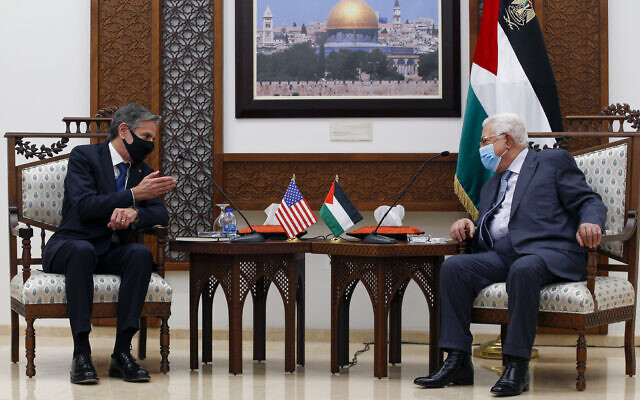It’s been five months since Secretary of State Antony Blinken announced that the US would be reopening its consulate in Jerusalem.
Bringing back the de facto mission to the Palestinians was a campaign promise of US President Joe Biden, part of a broader renewal of US ties with the Palestinians. Those relations all but dissipated under former president Donald Trump, who shuttered the consulate in 2019 and downgraded relations with Ramallah to a sub-file within the US Embassy to Israel.
But little to no progress has been made since the May announcement, and the cost of such a move appears to be growing steeper over time.
In July, Israeli officials began leaking that the Biden administration had agreed to hold off on reopening the consulate until after Prime Minister Naftali Bennett’s new government passes a budget in November. The logic behind the concession was that once the fragile coalition of parties spanning almost the entire political spectrum passes a budget, it will stabilize for the foreseeable future and be in a better position to swallow moves unpopular with right-wing constituencies.
Jerusalem played on one of the Biden administration’s main worries when it comes to Israel — the return of former prime minister Benjamin Netanyahu, who did not work well with the last Democratic president, a US source familiar with the matter told The Times of Israel. The strategy appears to have succeeded.
While Blinken said earlier this month that the US would be “moving forward with the process of opening a consulate,” the US source said the State Department has yet to even begin considering who might head that mission.
From left: Foreign Minister Yair Lapid, US Secretary of State Antony Blinken, and United Arab Emirates Foreign Minister Sheikh Abdullah bin Zayed al-Nahyan take part in a joint news conference at the State Department in Washington, on October 13, 2021. (Andrew Harnik/Pool/AFP/via Getty Images)
Moreover, Blinken’s statement on October 13 wasn’t a new update, but identical to the announcement he made in May while visiting Ramallah. Journalists who have inquired into the matter since have received a response from the State Department that includes that same quote as well, leading some to wonder how long the “process” might take.
After succeeding in pushing off the consulate reopening, Jerusalem has now changed its tune on the matter as the budget vote, which must be held by November 14, is swiftly approaching.
Foreign Minister Yair Lapid indicated in his first conversations with Blinken over the summer that his objections were related to more than specific timing, one Israeli official said.
“Inherent in the request to hold off on the reopening was a recognition that we would still move forward eventually,” the US source familiar with the matter said in August.
But in his meeting with Blinken in Washington this month, Lapid said reopening the consulate could cause the government to fall, regardless of whether it is done before or after the budget is passed, the Israeli official said. And the foreign minister added a new argument: reopening a diplomatic mission in Jerusalem for the Palestinians will lead to a flood of other countries following suit, thus damaging Israel’s sovereignty over the city.

The United States consulate general building in Jerusalem, March 4, 2019. (Ariel Schalit/AP)
Proponents of reopening the consulate note that doing so would simply mark a return to a long-maintained status quo, which saw roughly a dozen countries, including the US, operate missions serving the Palestinians from Israel’s capital.
A US official noted that the lack of a consulate hampered on-the-ground engagement with the Palestinians leading up to and during the May war with Gaza. As Israel plays for time, the Palestinian Authority continues to refuse to engage with the Palestinian Affairs Unit within the US Embassy to Israel that replaced the consulate.
PA President Mahmoud Abbas has more recently begun meeting with senior officials in the embassy under the pretext that the consulate will soon be reopened, but Ramallah’s directive barring mid- and lower-level diplomats from interacting with US diplomats in Jerusalem remains in force.
Following Lapid’s pushback, Blinken proposed that the two of them head a joint team that will hold discreet negotiations aimed at preventing the matter from turning into a larger diplomatic incident, according to a Wednesday Axios report.
Lapid responded positively to the idea, but asked for the US to hold off on even that until after the budget passes.
A senior Israeli official told ToI last month that while Jerusalem might vehemently oppose the consulate reopening, eventually it will have to concede to Washington, given the significant military aid and diplomatic backing the US gives Israel.
In the meantime, though, Jerusalem is working to “drive up the price” for Biden to fulfill his campaign promise, said the US source familiar with the matter.

Palestinian Authority President Mahmoud Abbas, right, meets with US Secretary of State Antony Blinken, in the West Bank city of Ramallah, May 25, 2021. (Majdi Mohammed, Pool/AP)
Blinken’s reported willingness to negotiate the matter with Lapid via a joint task force indicates that the US is willing to reach some sort of compromise with Israel on the matter, meaning Jerusalem expects to get something in return.
“They’re spending all of this political capital on a move that’s largely symbolic, and even if they manage to go through with it, the next ask from Israel on more important matters such as settlements and steps to actually improve Palestinian lives will be that much more difficult to achieve,” said one senior Democratic congressional aide.
“[Prime Minister Naftali] Bennett will be able to say, ‘Look, I already gave you the consulate, you can’t keep making such big asks,” the aide speculated.
“All [the Biden administration] had to do was change the sign on the door,” the staffer said, referring to the rather simple procedure that would be required to transform the mission on Agron street from a US embassy branch office back to a consulate. (Some measure of Israeli buy-in is required, though, since Jerusalem would need to credential whoever is tapped to head the consulate.)
Meanwhile, huddling on a matter that ultimately has to do with the Palestinians without including a representative from the Palestinian Authority is likely to further irk Ramallah, which believes the consulate reopening is a “done deal.”
“By waiting, we allowed the issue to snowball,” the staffer said.